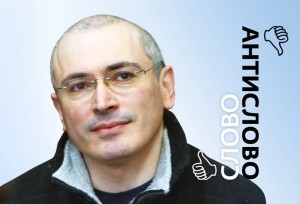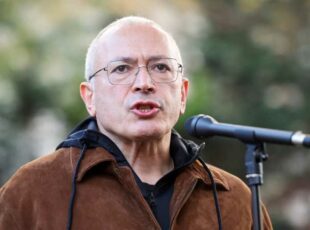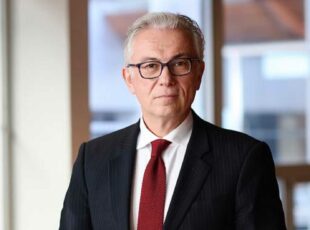“I Miss the Word ‘Love’” – Mikhail Khodorkovsky
“Moscow News” interview with Mikhail Khodorkovsky by Xenia Turkova, 14/09/2012
In the weekly column “Word and Anti-word”, within the project “Russian language”, the Moscow News is asking prominent people what words they like and what they do not. Today their interlocutor is Mikhail Khodorkovsky, who is imprisoned in the colony number seven in the Karelian town of Segezha.
What words, phrases, or expressions would you say are key today? What words seem to be particularly important to you right now and why?
– Love, companionship, helping one another, freedom. There are probably many other important words as well. I believe in God. God is love, God is free will; love and freedom are companionship and people helping one another. When your life is as intense as mine is, the importance of companionship, of helping each other, and of love — both in the narrow and the broad sense of the word — are things that you begin to understand with your mind and feel with all your soul.
Do “anti-words” exist for you? What would you call an “anti-word” of the times?
– The words that I use to signify the concepts that are most antagonistic to me — traitor, fascist. For me the concept of a fascist is different from the one used in political science — a tormentor who derives pleasure from the suffering of others or who is not even aware of it, a sub-human. Someone with whom you can not live on one earth. An absolute evil. A traitor is simply a vile, odious, and disgusting creature, contact with whom only gets you dirty. The “anti-word” of the times would have to be apathy. An apathetic person lives a meaningless life. He does not need anybody, and nobody needs him. Scary. There are many people like that today. Their punishment is aloneness. The second “anti-word” of the times.
Has this linguistic “scale” changed for you over the time that you have been in detention? Which words have slipped off to the sidelines, and which ones have moved front and center?
– Over the time I have spent in jail, my business terminology has gotten a bit rusty, and technological and production operations vocabulary “makes an appearance” only rarely. But then, “relationships words” and politico-philosophical vocabulary have moved to the fore, as has, unfortunately, the terminology of our “law enforcers”. Oil production, investments, lifting costs, fractionation columns, cracking, and other such terms have gone. Convicts,* the practice of the application of the law, penalty isolators, dungeons, terms (in the criminal-law sense) — these have appeared, unfortunately.
Has your attitude toward the word “freedom” changed?
– Of course, when I used to say the word “freedom” before, 100% of the time I was not thinking about physical freedom. Nowadays that is what I am referring to 50% of the time.
Are there words you miss particularly strongly?
– Of course. I hear these words during the rare visits and the brief telephone calls I am permitted. The main one of these is “I love”.
And conversely: what words do you not hear now (or hear rarely) and are glad about this?
– I can not think of any.
Jail slang interests many. Have you mastered it? Can one get by in detention without it?
– Jail slang does exist, but it is applied in a limited way. In the main it is the youth that has come from colonies for juveniles that loves using it. I know it to the extent necessary to understand what is being said. I intentionally do not use it myself, so as not to become accustomed over the long years (a cot — a “shkonka”; a spoon — an “oar”; a ration of bread — a “tyukha” or a “ptyukha”, etc.).
In this time have you encountered people whose speech has astounded or surprised you (by its imagery or precision, perhaps)?
– No. I have not seen many educated people in jail at all. And I have not met any who were as highly educated as that. There probably are some gold nuggets around someplace, but I have not had the occasion to run into someone like that in all my life in jail.
And what has changed over this time in the speech of Russian politicians, first and foremost the presidents? What has it become? What do you think, what words are key for Vladimir Putin?
– The speech of our politicians, especially the topmost people, is disturbing in its use of vulgarities. I am not a shining paragon of culture myself, but I believe that someone who is addressing a broad audience, especially someone who is a role model by virtue of the position he holds, has an obligation to actually be such a role model. On the whole, with the exception of a few of the liberals, politicians in our country tend to speak in a simplified fashion, orienting themselves at the little-educated strata, and do not make any effort to “lift” people up to a higher level of discourse.
What do you think about the slogans of the protest movement that has become activated in the last half year? To what extent are they constructive? Do you like the fact that Russian protest has acquired a somewhat playful form and the texts on the posters are more humorous than serious? What words would you add to these slogans?
– I like creative and playful forms as a complement to the key “serious” messages. A slogan has got to be both catchy and pithy. What the protest movement is doing now: it is articulating the shifting of society’s dissatisfaction onto Putin personally. And this is right. Putin has made himself the cornerstone of the system. Going forward, more constructive slogans will be required as well, however. Good examples are given by the Soviet propaganda of the “first years”: “All power to the Soviets!”, “Plants – to the workers, land – to the peasants, peace – to the soldiers!” I would add to the slogans words such as “honesty”, “fairness”, “renewal”, and “make way for the young!”.
Do you make any distinction between “your kind of words” and “not your kind of words”? By what word or expression can you determine that someone is not your kind of person?
– Of course there are some words that are “organic” to me, and there some that are “not organic”. And then there are perfectly ordinary words that arouse an incomprehensible irritation, like the word “eat”. Naturally, a person who uses thieves’ slang is immediately perceived of as not my kind of person, and conversely, someone who speaks perhaps simply, but “cleanly”, is perceived of as “my kind of person”. To single out individual words is a complex task for me.
Do you have a favorite word? A habit of speech?
– I am aware that I have a habit of over-using gerund constructions when I write. I am working on this. As for spoken language, that is complex. I try to stay away from parasite words and expressions, along the lines of “to be perfectly honest”.
What words would you remove from the Russian language?
– It seems to me that the Russian language is in need of a replenishment of its stock of words. People today are compelled to use unadapted borrowings, along the lines of “luzer” [loser], which either have another meaning entirely or signify something broader in meaning than the formal Russian equivalent (for example, [the Russian words that mean] “someone who has lost a game” or “a luckless person”). But there is no need to exclude words. Even such an historical borrowing from Polish as “bydlo” (livestock) — although “vegetables” is more precise and for some reason does not hurt as much.
*Khodorkovsky is intentionally placing the stress on the wrong syllable in Russian, most likely because this is the way prison system “insiders” pronounce this word.—Trans.




